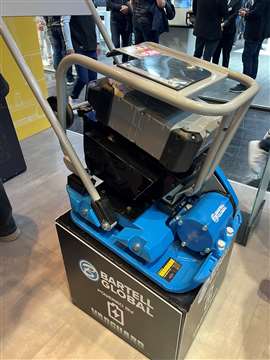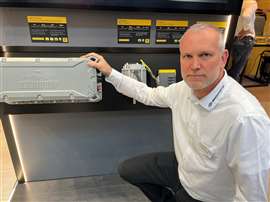Briggs & Stratton pushes battery standardisation at Bauma
16 April 2025
 A Bartell Global compaction plate powered by a Vanguard battery pack, on the Briggs & Stratton stand at Bauma. (Photo: KHL)
A Bartell Global compaction plate powered by a Vanguard battery pack, on the Briggs & Stratton stand at Bauma. (Photo: KHL)
Briggs & Stratton used the Bauma exhibition to highlight the growing number of equipment manufacturers using its Vanguard battery power packs, with products being shown by OEMs including Lissmac, Bartell Global, B-mac, Brendon Powerwashers, EqLab, Paclite, Muck-Truck and NTC.
The swappable Si1.5 battery packs can now be found on compaction plates and rollers, concrete saws, concrete trowels, floor saws, table saws, powerbanks, mini-dumpers and bowsers.
Paul Bramhall, director electrification/rental EMEA at Briggs & Stratton, said the company was talking to both OEMs and rental companies about how to shift to battery powered equipment; “With our Si1.5 swappable battery, we have a solution that could be a game-changing driver of the energy transition, enabling small to mid-sized OEMs to collaborate, expand their market share, and at the same time support rental businesses in achieving their goals.”
Speaking to International Rental News at Bauma, Bramhall said OEMs and rental companies were facing a complicated landscape, with multiple choices of supplier and technology.
“What I think the challenge is right now is everybody is looking at the upfront cost”, he said, “When companies look at the price and make decisions on battery size, they’re buying on a ticket price and then finding out that if you’re go smaller, you don’t get the runtime.
“What they’re doing is actually creating the problem they’re trying to avoid. They want as few battery types as possible, but because they’re shopping on price first, they find it doesn’t work and they change. And then you might have three or four different batteries.”
 Paul Bramhall of Briggs & Stratton pictured at Bauma. (Photo: IRN)
Paul Bramhall of Briggs & Stratton pictured at Bauma. (Photo: IRN)
He said the focus on low upfront cost was the real challenge; “because the OEM is trying to meet a certain price point. So, he’s going as cheap as he can go to meet that price.
“They could stop thinking about it in terms of traditional assets, with something fixed on it. If you go with smaller batteries, then you have a machine that might need three or four or five batteries. But if you get it right, you might only need one battery.”
Impact of working hours
Bramhall also called for a more nuanced view on equipment working hours, and a recognition of the difference between the time a machine is rented and its actual working hours; “What you find is people are overestimating how much the products are used…Right now they don’t have the insight into how much those products are used.”
He said standardising on battery type will help rental companies monitor actual usage and then size the battery appropriately; “so that they won’t need two, three or four batteries per machine.”
He said standardisation was why Briggs & Stratton was working with as many OEMs as possible; “That’s what’s helping rental companies, because if you can’t transfer batteries across multiple pieces of equipment, then you might as well just have a fixed battery on it.
“This effort gives a rental company that ability to go across brands, across applications and maximize your battery utilisation. And there you spread the cost over multiple assets.”
Speaking for one of the OEM customers, Oliver Brauchle, sales director at Lissmac, said it was using the Vanguard Si1.5 battery on its DTS 402 B masonry saw and CC 202 B compact floor saw; “it enables easy interchangeability across both products and fits within the broader construction portfolio of the group.
“The net result being that this will enable seamless integration into any rental fleet using this battery technology.”
Briggs & Stratton’s main business remains petrol engines, which power a wide range of construction and compact equipment.
The company showed a selection of its engines in Munich, including the Vanguard 160, 200, 300 and 400 EFI/ETC models, which offer “drop-fit” options for OEMs.
It was also showcasing its larger Big Block EFI/ETC engine, a 29.9kW unit that is being positioned as an alternative to diesel engines.
“These engines deliver the robust performance needed on construction sites while simultaneously reducing fuel consumption and maintenance costs”, said the company, “Vanguard’s Electronic Fuel Injection (EFI) technology optimises fuel efficiency, providing contractors with a cost-effective and eco-conscious solution without compromising on power.”
STAY CONNECTED



Receive the information you need when you need it through our world-leading magazines, newsletters and daily briefings.
CONNECT WITH THE TEAM







